NI Protocol: James Cleverly denies 'excluding' Sinn Féin from talks
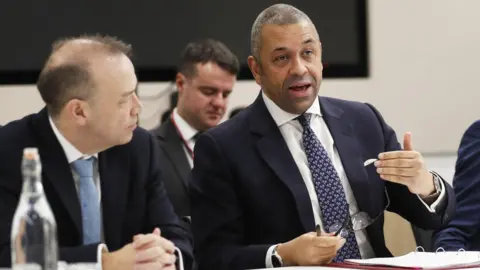 PA Media
PA MediaForeign Secretary James Cleverly has denied excluding Sinn Féin from an all-party meeting in Belfast.
Sinn Féin said its leader, Mary Lou McDonald, was told she could not attend the meeting on Wednesday.
But Mr Cleverly, who met with political and business leaders, said the party's deputy leader, Michelle O'Neill, was invited and "chose not to come".
Ms McDonald said the government's decision to "exclude" her was "bizarre" and "unacceptable".
Following the meeting, the foreign secretary said he wanted to meet the parties in Northern Ireland and would meet Irish politicians at another date.
He said: "My meeting here this morning was to meet the elected representatives of the people of Northern Ireland.
"I will of course be going to Ireland in the near future and I'll be meeting Irish politicians but I very much wanted to hear from the representatives of Northern Ireland."
Mr Cleverly described his visit to Northern Ireland as useful and welcomed the opportunity to speak to businesses impacted by the Northern Ireland Protocol.
Earlier, the UK government said the meeting was "for Northern Ireland politicians to talk through issues around the Northern Ireland Protocol".
It is understood Ms McDonald was not invited as she is the leader of the opposition in the Dáil (lower house of Irish Parliament) and that the UK government considers it against protocol for Mr Cleverly to meet her before he meets his counterpart in the Irish government.
The UK government also pointed out that there had been meetings with Northern Ireland political parties in the past where Ms McDonald had not attended, including when Prime Minister Rishi Sunak visited Belfast in December.
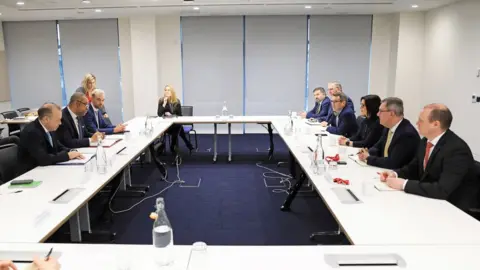 PA Media
PA MediaHowever, Ms McDonald, who had travelled to Belfast for the talks said: "Apart from this being beyond bizarre, it's a very bad message and a bad signal if the British Tories are now behaving in this petulant fashion.
"We're at a time where we need maximum cooperation, we need politics that is civil that is based on respect and that recognises the democratic mandate and responsibility of every party including Sinn Féin," she told reporters in Belfast.
"We are now eight months on from the election and people here had to endure a stalemate that is frankly not acceptable.
"The protocol is that when you host a leading of party leaders, you do not exclude one party leader from that meeting. This is a political meeting to assess progress.
"We are here in good faith - we want to get the work done."
As a result of the exclusion, the party said it would not be taking part in the talks at all.
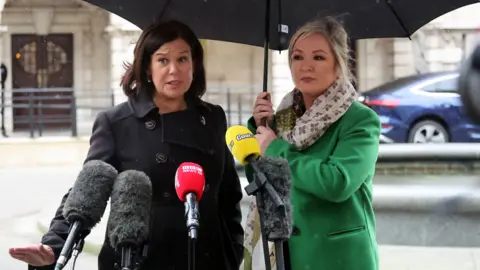 Pacemaker
PacemakerThe Social Democratic and Labour Party (SDLP) also said it will not attend the talks unless Ms McDonald is allowed to take part.
'Absolutely daft'
Stormont's power-sharing government collapsed almost a year ago when the Democratic Unionist Party (DUP) pulled its first minister out of office in protest over the Northern Ireland Protocol.
Speaking to BBC News NI at the talks venue, SDLP assembly member Matthew O'Toole called it an "absolutely daft" and "surreal" decision to exclude Ms McDonald from the talks.
He said his party could not "in good faith" attend the discussions as they should be about "maximum inclusion".
Alliance's Andrew Muir and Paula Bradshaw said the row was a "distraction" and that it was up to individual parties to decide who they send to the talks.
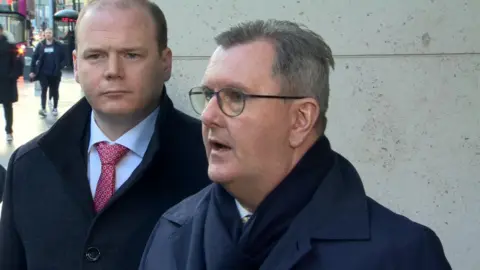
Speaking after his meeting with the foreign secretary, DUP leader Sir Jeffrey Donaldson said the talks were useful and productive.
Asked about the row over Mary Lou-McDonald's involvement in the talks, Sir Jeffrey said he would "not intrude on their grief on that matter".
Labour leader Sir Keir Starmer and Taoiseach (Irish Prime Minister) Leo Varadkar will hold separate talks in Northern Ireland on Thursday.
Mr Varadkar said he hopes the decision to exclude Ms McDonald is not a "new precedent".
"It's never been our practice to tell other people who should be on their delegation. If you ask to meet somebody or somebody comes to meet you, it really should be for them to decide who's on their delegation and who leads it," he said.
"That's the approach that we take, it had been the approach that the British Government took in the past, so I hope this was a one-off and that doesn't represent a change of policy."
Thursday's visits follow a UK agreement with the EU on customs data sharing.
That agreement was reached in talks on Monday between Mr Cleverly and the Vice President of the European Commission, Maros Šefčovič, which both sides said provided a "new basis" for talks.
Plants and seeds
Ahead of his Belfast visit, Mr Cleverly said issues remained with the protocol - part of the UK-EU Brexit deal that keeps Northern Ireland aligned with some EU trade rules - that risked and undermined the place of Northern Ireland in the UK.
"My preference is for a negotiated solution, but the UK's priority is protecting the Belfast (Good Friday) Agreement and preserving political stability in Northern Ireland," he said.
"I am listening to the concerns of people and businesses in Northern Ireland and am keenly aware that the current situation isn't working.

Political paralysis over protocol
Stormont has not had a fully-functioning executive since February last year, when the DUP withdrew as part of its ongoing protest against the protocol.
It keeps Northern Ireland aligned with the EU's single market for goods, avoiding the need for a hard border with the Irish Republic after Brexit.
However, it also creates a new trade border between Northern Ireland and the rest of the UK, something the EU accepts is causing difficulties for many businesses.
Some unionists say it is also undermining Northern Ireland's place in the UK.
The UK says the protocol is not working and plans to override most of the agreement if the EU does not agree to changes.
- Read more: A simple guide to the NI Protocol

A majority of members of the Northern Ireland Assembly elected in May 2022 are in favour of the protocol, in some form, remaining.
Sinn Féin, Alliance and the SDLP have said improvements to the protocol are needed to ease its implementation.
Unionist politicians want it replaced with new arrangements.
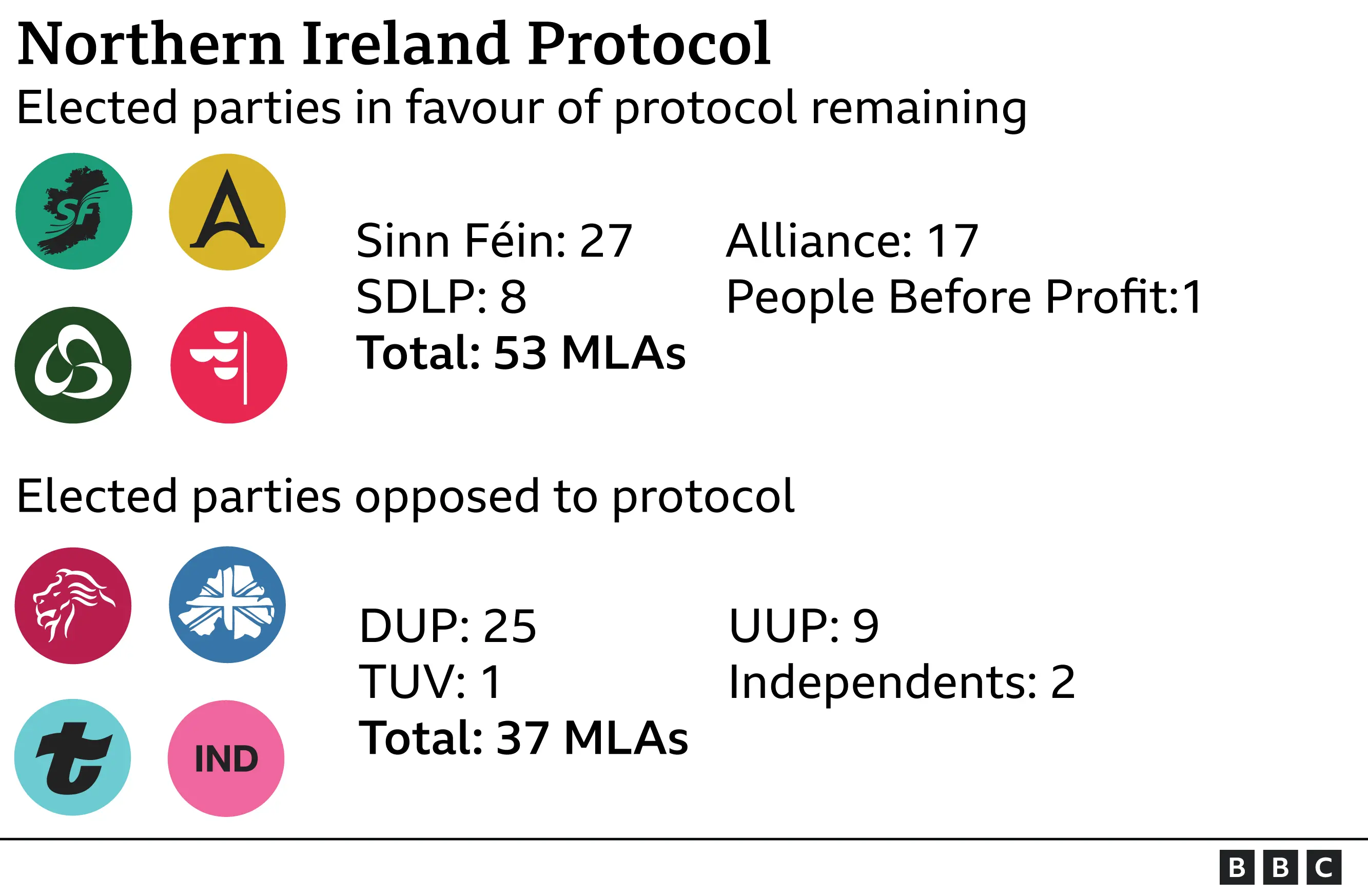
The foreign secretary and the Northern Ireland Secretary Chris Heaton-Harris were due to hold round-table talks with representatives from Sinn Féin, the DUP, Alliance, the Ulster Unionist Party and the SDLP.
Earlier, Mr Heaton-Harris called for a speedy return to devolved government.
"What people in Northern Ireland want most is to see their elected politicians back at work," he said.
"Accountable political leadership is fundamental to secure a sustainable future for all in NI."
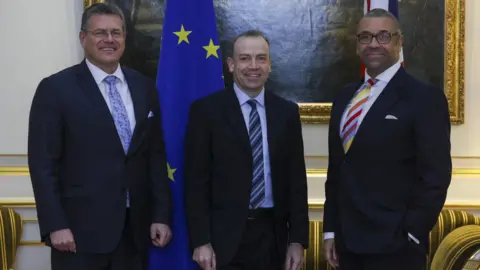 Foreign, Commonwealth & Development Office
Foreign, Commonwealth & Development OfficeThe next deadline for restoring an executive runs out on Thursday 19 January.
It is highly unlikely to be met, which means Mr Heaton-Harris is expected to trigger another 12-week period to allow the protocol negotiations to make progress.
